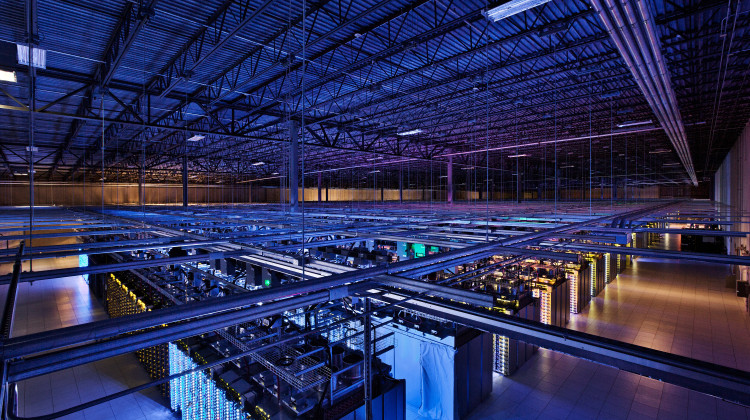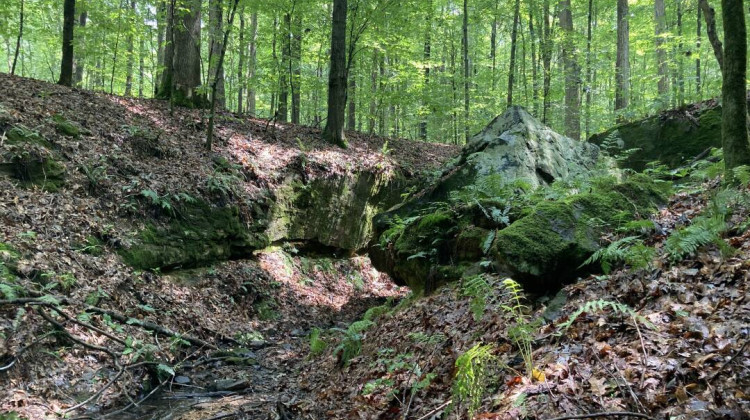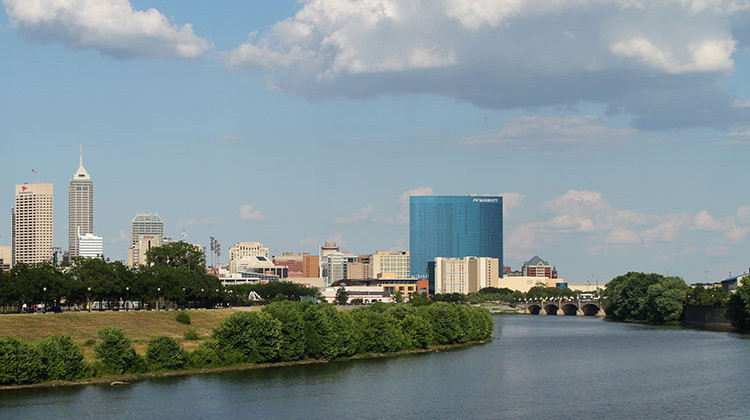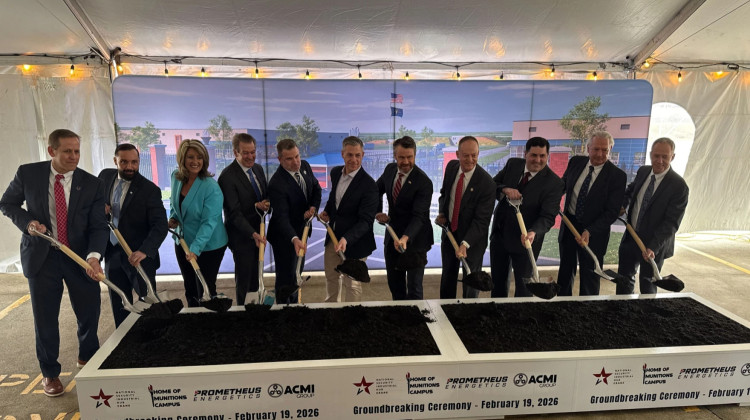
The inside of the Google data center in Council Bluffs, Iowa. New documents obtained by WFYI name Google as the company behind the proposed data center in Franklin Township.
Photo provided by GoogleGoogle was named as the company behind a proposed data center in Franklin Township, according to documents obtained by WFYI.
The documents shared with WFYI were provided by the planner for the City of Indianapolis in response to a resident of Franklin Township’s public records requests. The main document outlines questions from the city planning staff for the developer.
In response to one of the questions, the developer for the data center project mentioned the concealed company by name.
“If the Google team is OK with it, I suggest sharing two elevations,” the respondent wrote.
WFYI asked a Google spokesperson multiple times to confirm or deny if the company is behind the Franklin Township data center proposal, but the spokesperson did not comment, even as they answered several of WFYI’s other questions.
Up until this point, the name of the company has been hidden from the public while the proposal to rezone more than 460 acres to build a massive data center campus on Indianapolis’ southeast side continued to move through official channels.
On June 26, a Metropolitan Development Commission Hearing Examiner recommended that the request be approved despite pushback from residents during a public hearing. The proposal will be discussed by the nine-person Metropolitan Development Commission this month.
WFYI previously reported that at least one local elected official, who represents the district, had to sign a non-disclosure agreement with the company, preventing him from publicly sharing some of the project’s details — including the name of the company.
The secrecy has been alarming to residents, who said they feel like they’re being kept in the dark.
Across the country, the public’s concerns about environmental sustainability and the impact of these massive structures on local residents’ quality of life continue to mount. The concerns have grown amid a soaring demand for data centers that store and process large amounts of information, especially to power artificial intelligence.
But secrecy and the use of non-disclosure agreements in economic development projects like data center deals are common. Companies argue they protect their trade secrets, shield them from data breaches and competitors.
Critics, however, say the secrecy serves a different purpose: stifling community input.
“You would want to know the name of that company, so you could learn about how it's operated elsewhere, and you could decide, is it going to be a good neighbor or not?” Eric Bonds, a sociology professor at the University of Mary Washington, said in a previous interview with WFYI.
“This raises questions about when big companies come in like this that might just change the local dynamics of who's really calling the shots,” said Bonds, who teaches on the topics of human rights, climate change and environmental justice.
The race for data centers
The rise of artificial intelligence promises to change the face of industries and disrupt many aspects of people’s lives. But as the global race between the biggest tech companies heats up, environmental goals meant to combat climate change, protect public health and conserve critical natural resources — such as water — may be harder to meet.
Google is one of a handful of giant tech companies at the forefront of that race. These companies’ energy use is expected to continue to rise year after year. The Franklin Township proposed data center would be one of more than 20 data centers that Google has across the U.S., including in the Midwestern states of Iowa, Ohio and Oklahoma — and centers currently in development in Fort Wayne, Ind., and Kansas City, Mo.
In the documents obtained by WFYI, the developer of the project said that the Franklin Township data center will generate hundreds of construction jobs over the course of the project’s development, which is expected to take 5 to 10 years.
“This provides an opportunity to develop a highly skilled workforce that can maintain their roles at a single location for a long period of time. Once the initial building is complete, we would anticipate 50 full time operational positions working directly with the company at an average annual salary range of approximately $100k plus benefits,” according to responses in the document. “At full build out, there could be 200-350 full time operational positions working directly for the company.”
But communities worry these potential economic gains pale in comparison to the generous tax breaks tech companies are promised by the state, lost opportunities for other local developments, as well as the potential for negative impacts on their environment and quality of life.
AI is poised to drive a 160% increase in data centers’ power demand by 2030, according to an analysis by Goldman Sachs. That’s because AI is far more energy-intensive than typical cloud applications. For example, a ChatGPT query consumes 10 times more electricity than a regular Google search, according to the same analysis. This means that data centers now will continue to consume far more resources than they did years ago.
Communities, such as Franklin Township, worry that having a data center like this will impact their health.
Early research into the impact of these data centers on local communities is starting to yield some findings. Researchers at the University of California Riverside and CalTech found that data centers contribute to a rise in pollution-related illnesses — such as asthma, cancers and other diseases — and cost the U.S. billions of dollars in public health expenses. The researchers published their findings in the non-peer-reviewed, open-access journal arXiv. They estimated that Google generated the largest public health costs of $2.6 billion between 2019 and 2023.
A Google spokesperson, however, told WFYI that the study’s “assumptions vastly overstate emissions associated with data centers.”
“Our diesel generators are only used during routine maintenance or power grid outages which are very rare. The study also doesn’t account for our clean energy purchases in the local markets where we operate,” according to an emailed statement by the spokesperson.
Google has promised — including in a video titled “How do data centers benefit your community?” — that by 2030 all of its data centers will be running on clean energy sources all year long. The company also said that Google invests in the local organizations and communities where its data centers are located through grants, education programs and other initiatives that align with local needs and priorities.
But according to a Guardian analysis, from 2020 to 2022, the real emissions from data centers owned by Google, Microsoft and Apple are estimated to be 7.62 times higher than officially reported thanks to “creative accounting” tools.
The analysis specifically points to the companies’ use of what’s known as Renewable Energy Credits, which are certificates that companies purchase to show they are buying electricity generated from renewable sources to match a portion of their overall electricity consumption. But the energy associated with these certificates does not have to be used by the companies’ actual facilities. This means that companies may claim lower emissions by offsetting their consumption through the purchase of these renewable energy certificates, regardless of where or when the renewable energy was produced or consumed relative to their data centers.
Notably, Google has phased out the use of those renewable energy certificates in 2021 and directly reports location-based emissions. In Google’s latest annual environmental report, the company reiterated its ambitions to achieve 24/7 carbon-free energy on all of the grids that they operate — meaning that every kilowatt-hour of electricity the company uses is matched with clean power produced on the same grid during the same hour.
Residents push back against data center
Local residents — who launched a campaign against the data center in Franklin Township — have called for more transparency as they expressed concerns about their water and utility bills.
A 2025 paper out of Harvard University found that secret deals between utilities and tech companies can shift energy costs onto nearby residents, especially as infrastructure may require updates to sustain the data centers’ needs. And as the servers in these massive data centers continue to power the energy-intensive demand for AI, they will need more water to cool down.
Like other tech giants, Google often requests to use huge amounts of water in areas where it plans and builds data centers. In the new document shared with WFYI, the developer wrote that the site is being planned "with the abilitiy to utilize 2-3 million gallons of water", which they say Citizens Energy has indicated is available to the project on a day of maximum need. They added that this maximum need day is similar to the amounts permitted for businesses with zoning for light manufacturing.
In just 2019, before the recent artificial intelligence boom, Google requested, or was granted, over 2.3 billion gallons of water for data centers in three states, reporting from Time Magazine found in public records posted online and legal filings.
Meredith Sharp, a resident of Franklin Township, lives just blocks from the site of the proposed data center and runs an herbal skincare business. Sharp uses her 3-acre property to grow product ingredients.
“If this were to pass, I'm going to lose my farm,” said Sharp, who worries the center will strain the water supply she uses and worsen flooding due to more concrete and buildings not soaking up extra water. She said she’s concerned about what she claims is a track record of Google trying to hide its real impacts on the environment.
“For companies that are out there actually trying to do the right thing and farm organically and do all of that, it's being eliminated by companies that profess to do that.”
Farrah Anderson is an investigative health reporter with WFYI and Side Effects Public Media. You can follow her on X at @farrahsoa or by email at fanderson@wfyi.org.
 DONATE
DONATE






 Support WFYI. We can't do it without you.
Support WFYI. We can't do it without you.